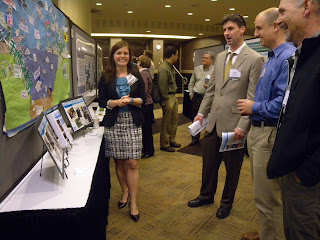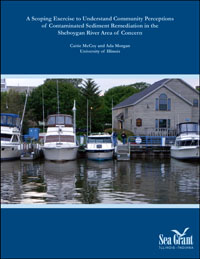 IISG’s Caitie McCoy attended the Seventh International Conference on Remediation of Contaminated Sediments last week to present her community outreach work with the Great Lakes Legacy Act (GLLA). The conference traditionally features environmental scientists and engineers, but that is changing. “We are starting to see more attention paid to community engagement at these types of conferences,” Caitie tells us. “Technical project managers realize that projects are easier to implement when the community understands and supports the work, and so they’re eager to learn from professionals who specialize in community engagement and stakeholder involvement.”
IISG’s Caitie McCoy attended the Seventh International Conference on Remediation of Contaminated Sediments last week to present her community outreach work with the Great Lakes Legacy Act (GLLA). The conference traditionally features environmental scientists and engineers, but that is changing. “We are starting to see more attention paid to community engagement at these types of conferences,” Caitie tells us. “Technical project managers realize that projects are easier to implement when the community understands and supports the work, and so they’re eager to learn from professionals who specialize in community engagement and stakeholder involvement.”
Caitie presented a poster on her educational program in northwest Indiana, which taught students about the GLLA sediment cleanup at Roxana Marsh on the Grand Calumet River. Instead of presenting a typical scientific poster full of text and graphs, Caitie displayed a mural that her fourth grade students made to represent the Roxana Marsh ecosystem.
“Some of my colleagues were a bit skeptical about me presenting a fourth grade mural to a bunch of technical folks, but I’m not afraid to shake things up,” Caitie said. “I wanted to use something eye-catching that would draw people’s attention toward my poster.” And it worked. Caitie was visited non-stop during the session and talked to more than 100 conference attendees about her program. When asked if she thought her poster made an impact, Caitie replied, “I would never have dreamed that someday engineers would be asking me how to replicate my educational program at their sites, so I take that as a big success.”
 Caitie will expand her programming throughout the Grand Calumet River community in 2013, as the Legacy program begins another phase of dredging this summer.
Caitie will expand her programming throughout the Grand Calumet River community in 2013, as the Legacy program begins another phase of dredging this summer.
A lot of people might know that Illinois-Indiana Sea Grant’s primary mission is to help protect and preserve the Southern Lake Michigan waters. But most people might not know about the many ways our program goes about doing just that.
With the help of staff members, researchers, educators, and more, we’ve produced a video that offers a glimpse at the program and the ways we work for and with the public to ensure safe waters and healthy ecosystems in both states.
Watch the video below to learn more about Illinois-Indiana Sea Grant, and share it with anyone who cares about keeping Lake Michigan healthy, beautiful, and safe.
One of the unsung agencies that is heavily involved in restoring coastal ecosystems just happens to be one of the biggest and most crucial – The U.S. Army Corps of Engineers.
The U.S. Army Corps of Engineers and their Ecosystem Restoration Program are heavily involved in planning, developing, and executing projects that restore damaged ecosystems and areas and provide environmental benefits to communities, including several projects in and around the Great Lakes.
“The USACE works to restore degraded ecosystems to a more natural condition through large-scale ecosystem restoration projects, such as the Comprehensive Everglades Restoration, Louisiana Coastal Area Ecosystem Restoration, Chesapeake Bay Oyster Recovery, Aransas National Wildlife Refuge Beneficial Use of Dredged Material (restoration of marsh critical to the endangered Whooping Crane), and Houston Ship Channel Beneficial Use of Dredged Material (marsh restoration in Galveston Bay), and by employing system-wide watershed approaches to problem solving and management for smaller ecosystem restoration projects.”
Read more about this terrific program and about the substantial work that goes into these projects at the article linked above.
Community members, stakeholders, and several agencies have been involved in an extensive cleanup project in Muskegon Lake for the last few years, and just this month they celebrated the project’s completion.

The Great Lakes Legacy Act project began with the development of a master plan and secured funding, with the goal of cleaning and restoring the lake’s natural habitats. By doing so, fish and wildlife populations can be restored, and the lake will be cleaner and safer for recreational use as well.
Caitie McCoy, Illinois-Indiana Sea Grant’s environmental social scientist, has been heavily involved in several remediation and community outreach projects, including outreach for the EPA during the entire Muskegon Lake cleanup and restoratio
n.
Caitie wrote to update us on the great progress that they’ve made restoring the lake. “The project
removed 43,000 cubic yards of sediment contaminated with polynuclear aromatic hydrocarbons (PAHs) and mercury from Muskegon Lake, which flows into Lake Michigan. It also included habitat restoration in the area.”
Caitie was onsite for the project completion, and worked with John Karl from Wisconsin Sea Grant to compile video footage. That footage will be part of a video being produced about Great Lakes Legacy Act cleanup projects including Muskegon Lake. Check back here to the blog later this year when we’ll have the video posted.
(Pictured above is Dennis Kirksey of Muskegon Lake Watershed Partnership, a landowner in the area who played a large role in helping the project reach completion.)
Communication is a crucial part of any project, and especially one as significant as cleaning up an ecosystem that has been deemed an Area of Concern. One of those AOCs is the Sheboygan River, and Illinois-Indiana Sea Grant Environmental Social Scientist Caitie McCoy has been very involved in the remediation project, working with and reaching out to the communities that live near and rely on the river in a variety of ways.
To better understand community views and concerns about the river and the river cleanups going on this summer, several interviews were conducted with local stakeholders. The findings and resulting recommendations are presented in a qualitative study put together by Caitie and Ada Morgan, entitled “A Scoping Exercise to Understand Community Perceptions of Contaminated Sediment Remediation in the Sheboygan River Area of Concern.” You can download and read the entire study here.
IISG’s Caitie McCoy attended the Seventh International Conference on Remediation of Contaminated Sediments last week to present her community outreach work with the Great Lakes Legacy Act (GLLA). The conference traditionally features environmental scientists and engineers, but that is changing. “We are starting to see more attention paid to community engagement at these types of conferences,” Caitie tells us. “Technical project managers realize that projects are easier to implement when the community understands and supports the work, and so they’re eager to learn from professionals who specialize in community engagement and stakeholder involvement.”
 Caitie will expand her programming throughout the Grand Calumet River community in 2013, as the Legacy program begins another phase of dredging this summer.
Caitie will expand her programming throughout the Grand Calumet River community in 2013, as the Legacy program begins another phase of dredging this summer.


